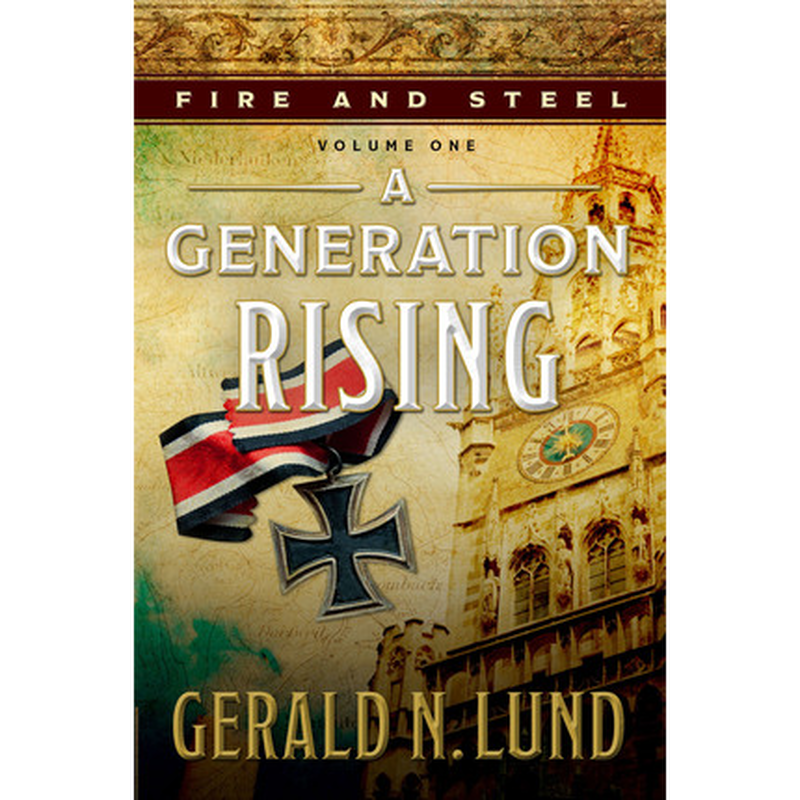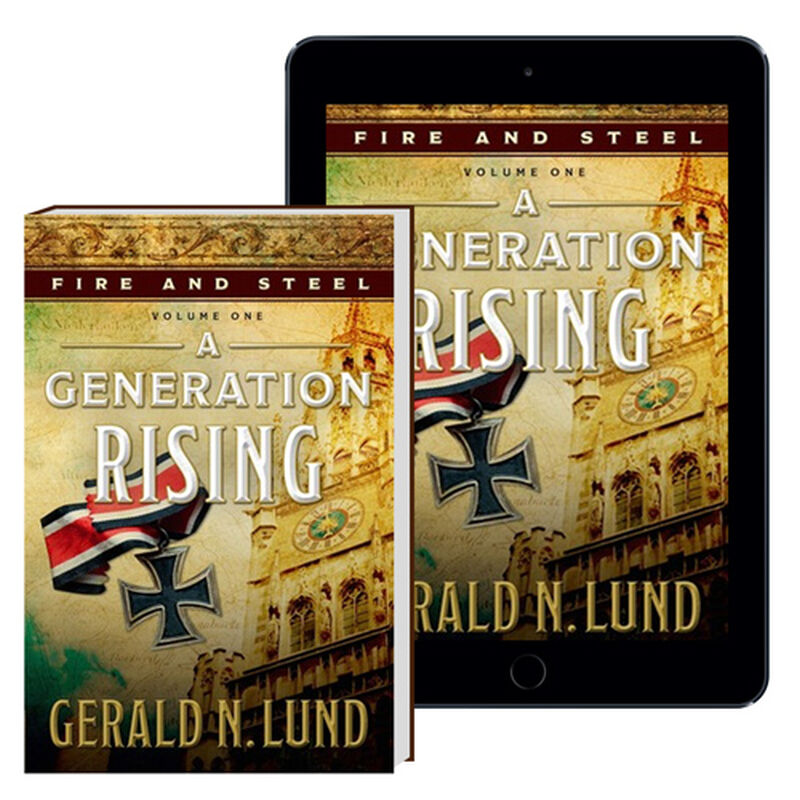FREE SHIPPING on orders of $49 or more + SAVE $10 on $50 with code MOTHERSDAY24. Exclusions apply.
A Generation Rising
Fire and Steel, Vol. 1
Read a Chapter × Fire and Steel GERMANIA Germania and the Holy Roman Empire By the time of Christ and the Christian era, the Roman Empire, with its insatiable quest for land, riches, slaves, and power, had swallowed up much of the European continent. One could leave the Roman capital and travel in a northwesterly direction on well-maintained Roman roads for 1,200 miles. But if one traveled due north, up the long boot of Italia and across the Alps, one quickly reached the northern border of the empire. In the vast lands to the north of the Danube River and to the east of the Rhine lived a collection of tribes so fierce, so warlike, and so incapable of being civilized that eventually the Roman legions fortified the southern border of those lands and left the people alone. Caesar called that unconquerable north land with all of its dozens of tribes Germania. The Germani were not farmers other than having small garden plots cultivated by individual families. They were hunters and warriors. No one owned land as permanent property. Each year the tribal chiefs would assign land to the clans, who then parceled it out to their people. But the next year, everyone was impelled to move to a new place so that the people didn‚Äôt become focused on the land and lose their zeal for war. This also kept them from building permanent shelters against the cold and the heat. Too much comfort weakened the character, they thought. The men generally each had one wife, and adultery was rare. The opinions of women were respected to the point that they often accompanied the men into battle to give them counsel and encouragement. Robbery among their own people was not tolerated, but it was encouraged when it involved outsiders. Often, senior chieftains would lead plundering expeditions to give the young men experience in battle and help them avoid idleness. To the Germani peoples, the highest glory was to lay waste to lands bordering their territory, thus making them uninhabitable. They saw this as proof of their valor. It also kept their borders secure from invasion. The Germani did not keep written records, so not much is known about them from the ensuing centuries. They must have consolidated the tribes to some degree, because when the French King Charlemagne was appointed to be the first ruler of what came to be known as the Holy Roman Empire, the Kingdom of Germany was largest group within it. In the minds of Germans ever after, the Holy Roman Empire came to be known as the First German Reich. The Protestant Reformation and the Thirty Years‚Äô War After Charlemagne‚Äôs death, the empire limped along for centuries, almost dissolving due to the weak leadership of Charlemagne‚Äôs successors. Then in AD 962, Otto I, Duke of Saxony and king of Germany, was crowned emperor by the pope. The former rights held by the Roman Caesars now rested in German hands. Otto immediately set about to unify the Germanic tribes under the leadership of a central government. However, the fiercely independent spirit that had kept the Germani unconquerable for so many centuries was not so easily quelled. Powerful kings and princes were on the rise in other countries. Ruling dynasties brought stability and consistency to their subjects, often over many generations. Not so in Germany. As the centuries came and went, Germany remained a hopelessly fragmented, impossibly crazy patchwork of over 300 separate states. The Protestant Reformation swept across Europe with hurricane force beginning with Martin Luther nailing his Ninety-Five Theses to the door of the Castle Church in Wittenberg on October 31, 1517. But Luther‚Äôs impact on Germany went far beyond his Protestant vision of Christianity. His German Bible provided a standardized language for the people and became a powerful unifying influence. His doctrines of the freedom of individual conscience electrified the people and changed the culture profoundly. People were motivated to study and learn for themselves. Literacy rates increased. The arts and commerce thrived. Prosperity rose. Many of the Protestant German princes extended new freedoms to their people. A new sense of German pride and German nationalism began to develop. Inevitably, the Reformation also brought war. These were considered issues of eternal consequence. The divisions became so bitter and acrimonious that both sides took up the sword to defend their faith. Rulers all across Europe were forced to decide where they stood. Soon all of Europe was divided into two major religious camps. About a hundred years after Martin Luther‚Äôs bold action, one of the most devastating of the religious wars began. In this case it was not solely about religion. Competing dynasties were jockeying for power. Savage war raged across Europe off and on for three decades, earning the conflict the name the Thirty Years‚Äô War. Germany lay right in the center of the conflict and was hit the hardest. Entire regions were utterly devastated. Thousands of towns and villages were destroyed. One-third of the population was lost to war, famine, disease, or being hauled off as slaves. In the end, the Thirty Years‚Äô War virtually snuffed out every sign of the surge in culture, learning, arts, and commerce that had resulted from the Reformation. The Germany that was rapidly becoming one of the fountains of European civilization disappeared as a tidal wave of barbarism returned. Civilization came to a standstill in Germany while the rest of Europe moved forward into the new age. In these circumstances, it is not surprising that the German character became ingrained with a fatalistic acceptance of tyranny, autocratic and capricious rule, and suppression of law and human rights. Close The strongest steel is forged in the hottest flames. From master storyteller Gerald N. Lund comes a new blockbuster series chronicling the lives of two families who will face some of the most turbulent times in history as they are tried to their very cores. Will they be tempered and strengthened by the hammering blows, will they bend to the point of breaking, or will they completely shatter? As volume one begins, life could not be more promising for the Eckhardts. They finally have a son, Hans, the male heir they have longed for and a child of such brilliance and promise that his success seems certain. But as youthful Hans‚Äôs ambition takes him away from his family and their small Bavarian village, the winds of unrest in Europe are about to erupt into the greatest war the world has ever known. Kicking off a story that will cross generations‚Äîand continents‚Äîthe Eckhardts must brace themselves to weather the storms and turmoil that lie ahead. Only through sheer determination and fortitude will they be able to pass through the refiner‚Äôs fire and come out stronger and more united than ever before. Unabridged audio book
Author LUND, GERALD N.
Narrated by Kirby Keyborne
Number of discs 7
Narrated by Kirby Keyborne
Number of discs 7


